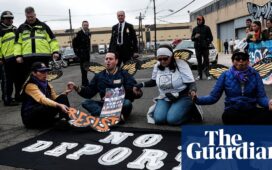I am seeking asylum in the US because of a hydroelectric dam. I fled Honduras fearing for my life after being teargassed and arrested by police when our community resisted a dam which contaminated the water we rely on for drinking, cooking and washing.
I come from a small community where our water flows from the mountains into the River Mezapa. The communities who rely on the river organised many years ago to install a water system which stores and distributes water to people’s houses.
Every household paid a monthly contribution to ensure the riverbanks stayed clean, and the system functioned well. We had enough water, and it was crystal clear – clean enough to drink.
The problems started as soon as construction began: the dam company chopped down lots of trees on the river bank. The water turned browny yellow and tasted like iron, so we couldn’t use it any more.
In early 2017, a roadblock was set up in the Pajuiles community to stop the heavy machinery getting past. At first I didn’t want to get involved: I was scared because there are powerful people behind the dam.
But as our clean water turned to mud, I realised that if we didn’t stop the dam we could all die from thirst.
Early in the morning of 15 August 2017, we were coming to the end of the night shift at the roadblock when we heard that the police were on their way. It was only my third or fourth time at the roadblock.
Suddenly, there were armed police and Swat teams everywhere, throwing teargas into people’s houses. There was so much smoke we could barely see, and I’ve suffered from blurry vision ever since.
I ran into a house but went back out to look for my son – and that’s when they arrested me. Ten of us were arrested, including several elderly neighbours and a pregnant woman. We were held from 10am to 1am the next day.
Our camp was destroyed, and the police escorted the company’s machinery to the river. We were charged with trespass for blocking a public road. The police took our photos – and this really frightened me because in Honduras, the police kill ordinary people.
I became even more scared when a few months later in January 2018, a colleague in the community struggle, Geovanny, was murdered by men in police uniforms who came to his house with a photo in hand, dragged him into the street and shot him dead.
If they did that to him, they could kill me too, and then who would support my children? In Honduras, money is power, and we, the poor people, don’t have access to justice.
That’s why I left Honduras. That’s why I’m seeking asylum in the US.
The charges against me were dismissed in February 2018, and I immediately left with my youngest child, who was just two. We spent a month in Tapachula in Mexico, and then we joined the first big migrant caravan from Honduras.
It was a very tough journey, I was very scared travelling on top of the train, The Beast, never letting go of my son in case he fell. We had nothing, but people in Mexico helped us with food and blankets.

After crossing the border at Tijuana, we spent eight days in the hielera, [Spanish for “ice box”, the name migrants give the notoriously cold Customs and Border Protection holding cells].
It was awful, the lights never went out. My son was ill – he was so cold, I was terrified that he’d get pneumonia. Then we spent 13 days in detention in San Antonio, and a month in a shelter in San Benito, before Raices [a Texas-based group that provides legal services to immigrant and refugee families] helped us find a family to stay with in Portland, Oregon.
It’s hard, this is my first time away from home and I’ve six other children, aged six to 18, who are staying with different friends and relatives. My body is here, but my mind is always in Honduras.
My asylum court date is set for October 2019, if they reject my claim and send me back, where will I go? I can’t go home, I’m too scared.
Wendy García, 37, a single mother of seven children, is an anti-dam activist from Toloa Adentro, a village in northern Honduras. She is currently seeking asylum in the US








